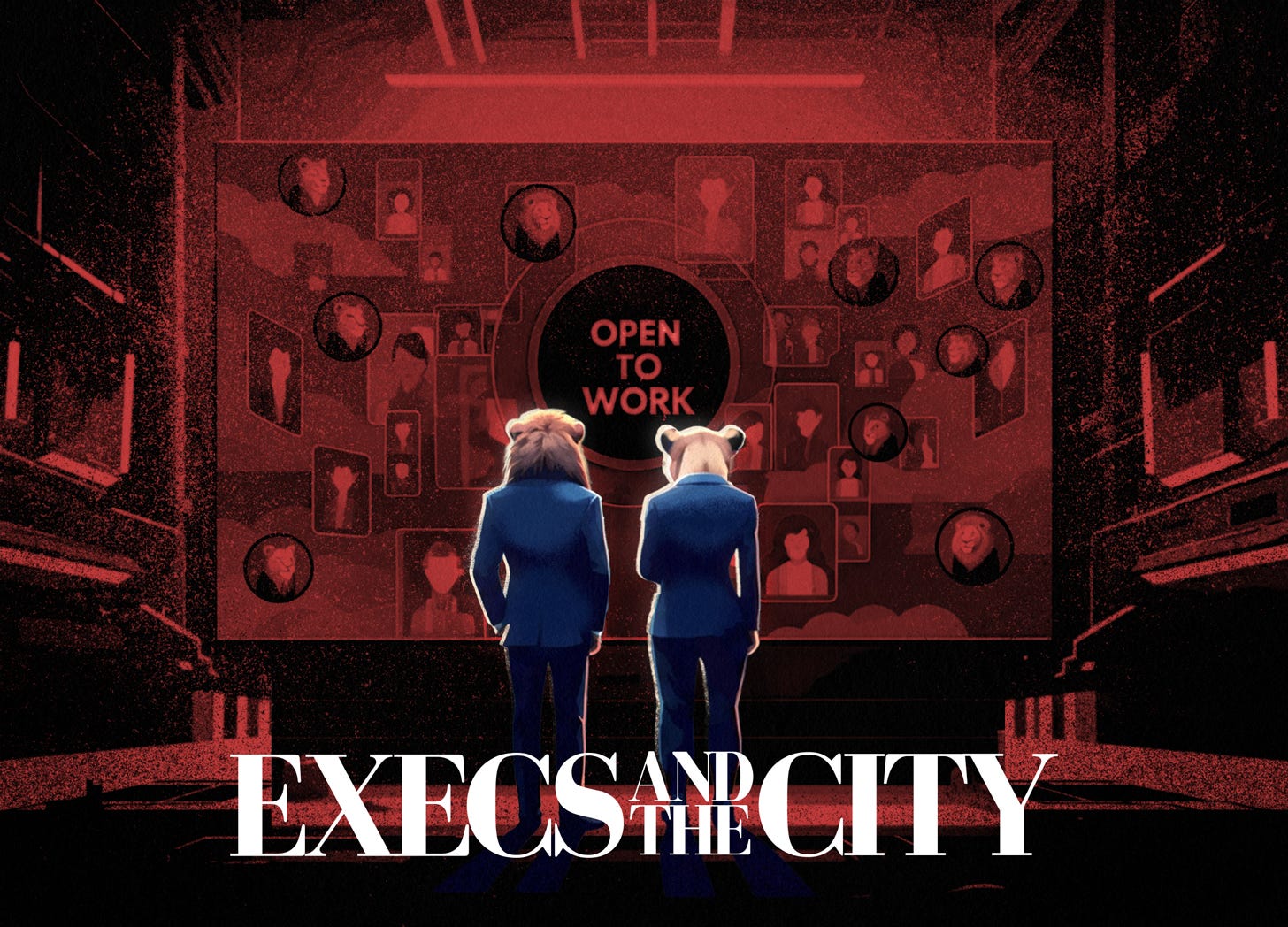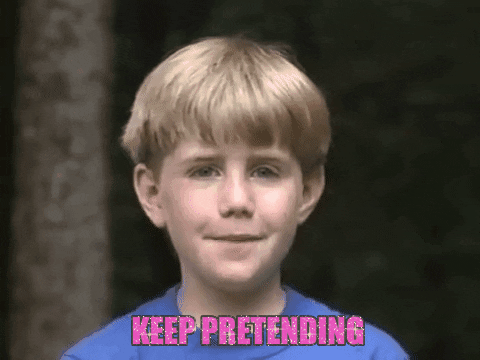Your LinkedIn Reveals Why You're Not Getting Hired
Stop unknowingly sabotaging your job search. Your public commiseration on LinkedIn is branding you as a problem, not a solution—and costing you 7-figure opportunities.
The pattern is so predictable, I could set my watch to it.
A marketing executive posts about the "impossible" job market. Within hours, thousands of reactions and comments pile on. The comments section becomes a support group for the defeated and the ghosted.
These posts always seem to feed the LinkedIn algorithm Gods—an unfortunate side effect of LinkedIn becoming more like TikTok and less like a professional reputation and career management platform.
Everyone agrees—the hiring system is broken. Companies want unicorns. The requirements are insane. It's not fair. (I’d argue that chasing the top 1% of all employment is never going to be fair, but I digress).
And in that exact moment—without realizing it—every single person waving their fists at their grievances just jeopardized their job search.
What you're broadcasting right now, in real-time, on your LinkedIn feed will derail you.
Here's what too many don't see—every time you comment on these posts, your little LinkedIn profile photo follows your words. You're literally branding yourself—that tiny headshot cementing an impression—as someone who commiserates rather than conquers.
Sure, calling this out brands me as an inconsiderate asshole.
But I'll take the cheap shots from weak executives playing dress up on LinkedIn, fooling surface-level followings with shallow AI-written content.
I'm not happy about that, but I care more about results for my clients than the opinions of poor-fit executives in title only.
The reality is—facts don’t care about your feelings. Any experienced capitalist knows that.
Tough markets aren't the time for sugar coating—they're the time to take meaningful action.
Real revenue is more meaningful than followers—right?
Every reaction, every comment on a complaint thread, is building your reputation as someone who sees problems, not possibilities. Which you’ll notice is not synonymous with traits people use to define leaders.
Because here's what these "executives" don't understand.
While some are busy organizing their pity party and pumping vanity metrics, their competitors are landing 7-figure packages.
I've supported six new millionaire earners just this year.
Same "impossible" market. Same "unicorn" requirements. Same brutal conditions.
So why do some executives keep winning while others perpetuate their losing streak?
The difference?
The winning executives stopped making excuses and started making moves.
They don’t bury their head about the crap market—but they don’t wax poetic about it either.
There is no time to dwell, unless you enjoy sacrificing $30-$75k a month in lost wages.
The Two-Comma Club Divide
I've watched this divide play out in real-time for years.
Let me tell you about two CMO candidates whose paths diverged in ways that perfectly illustrate this principle.
Both from similar backgrounds. Both facing the same market. Both frustrated by the landscape.
John (not his real name) joined an on-the-bench group focused on "supporting each other through these challenging times." He spent 90 minutes a day commiserating with other executives about how unfair the market had become. He liked every post about impossible requirements. He commented supportively on every rant about ghosting recruiters.
Meanwhile, Jenny took a different path. She saw the same posts, felt the same frustration, but asked herself one question: "If the bar is this high, how do I become the person who clears it?"
18 months later:
John is still in the same on-the-bench group, now discussing how to "survive" over a year of unemployment and more despondent than ever. He also brings everyone down around him.
Jenny signed a deal that brought her into the two-comma club after 6 months of searching with a first-year package well into seven figures. She lifts everyone up around her.
The kicker?
John and Jenny crossed paths in the same job search support group.
Jenny immediately recognized how defeated and downtrodden the environment was and left immediately—going as far as canceling her community membership because the group didn't embody the leadership qualities she was looking for.
She moved her investment elsewhere (in this case she invested in time to deepen her network, coaching, and an employment attorney).
Here's the dirty secret about these job search groups—they're often led by ambitious executives who are also out of work.
You wouldn’t take fitness advice from a fat personal trainer—why would you take job search advice from the unemployed?
Every professional community has a transition group, but it's never their core focus. It's an afterthought, a service add-on because the community's most active members tend to be unemployed—they have time to engage, and they often expect the community to act as their personal networking and outplacement hub.
What happens?
Because these transition groups aren't properly funded or professionally managed, an ambitious but unemployed executive volunteers to lead.
Their intentions are good, but it becomes the blind leading the blind.
Without experienced moderation to acknowledge frustration while redirecting energy toward solutions, these groups devolve into echo chambers of defeat time and time again.
For these groups to work, you need an experienced professional steering the ship—someone who can validate the struggle while relentlessly focusing the group on action and accountability.
Instead, you get amateur group therapy sessions that reinforce victim mentality and drag out job search times.
It's not popular to criticize people with good intentions—but the reality is that the results from these groups are overwhelmingly ineffective.
Want a solution?
Try a Never Search Alone group by Phyl Terry instead—which is a much stronger experience than an afterthought tack-on to whatever executive community you belong to. At least there you'll find structured accountability and proven methodologies, not just shared misery masquerading as support.
The Interview You Don't Know You're Having
Recruiters check your LinkedIn activity before presenting you to their client. Not just your profile. Your posts. Your comments. Your reactions.
They're not looking for perfection. They're looking for patterns.
And when they see you piling onto threads about how impossible everything is? That's a pattern. A pattern that screams: "This person will bring problems, not solutions."
That’s not a perception you want to own.
One recruiter told me recently: "There is nothing more disheartening than seeing a candidate's top post be a viral complaint about the market or their job. It's an immediate red flag."
Think about it from their perspective. They're about to recommend you for a role where you'll face:
Impossible deadlines
Unrealistic expectations
Budget constraints
Difficult stakeholders
Market headwinds
Competitive pressures
If you can't handle job search adversity without public complaint, why would they believe you can handle actual business adversity?
Their neck is on the line if you don’t work out—and you’re not making it easy for them to stick it out.
The logic is brutal but simple—leaders who blame the system don't change the system. They become victims of it.
Again, I’m not suggesting that these job search challenges don’t exist—and I’m not advocating for mass gaslighting hypnosis to avoid talking about it altogether—I mean hell, I wrote scathing commentary about The 7 Habits of Highly Toxic Companies—I am not a toxic positivity try hard.
I’m just saying—don’t be stupid.
Complaining and generic AI content shotgunning lowers your status amongst the exact people you are eager to attract.
The Marketing Paradox That Exposes Everything
Here's the irony that should keep every unemployed marketer up at night.
Your entire job—your core competency—is to master and lead messaging, influence, and persuasion.
You're supposedly an expert at navigating markets, adapting to audience feedback, and pivoting strategies when something isn't working.
Yet here you are using the same dead messaging that isn't resonating.
The same LinkedIn presence that screams "desperate." The same interview approach that keeps getting you ghosted.
Think about that for a second.
If you ran a campaign that failed for months straight, what would you do?
You'd A/B test. You'd analyze the data. You'd completely overhaul your approach. You'd experiment until something clicked.
But with your own career?
Many will simply complain that the market doesn't appreciate their genius all while running the same tired playbook that worked for them a decade ago in bull market territory. Are you serious?
When companies push unrealistic demands or try to lowball you, where's your legendary persuasion skill? Where's the messaging mastery that repositions their thinking? Where's the influence that educates them on what elite marketing actually looks like? Where’s that leadership instinct that challenges bad decision making?
If you can't market yourself effectively and challenge leadership—if you can't influence your own job search outcomes—maybe, just maybe, this market correction is revealing something uncomfortable— you may not be as skilled at marketing as your LinkedIn title suggests.
And perhaps that's the real reason it's harder to land a job doing what you claim to be an expert at.
The market isn't confused about your value. You are.
And this bears the most annoying question I ask nearly all executive leaders, “How much of the situation you’re in is your fault?” How much starts in the mirror?
I can quickly tell who the real deal executives are based on how they answer that question.
The Ownership Test Nobody Talks About
It's easier to stay angry than to be honest—that’s why these posts go viral in the first place.
If you're positioning yourself for VP or C-suite roles, you're explicitly claiming you can:
Navigate complex systems
Influence outcomes despite constraints
Transform challenges into advantages
Lead others through uncertainty
But then you hop on LinkedIn to announce that you're powerless against... job descriptions? Ghosting? The changing market?
Job search is a pillow fight compared to leading a company—and hundreds or thousands of team members—through economic headwinds.
The contradiction is so glaring, it's almost comical. Except nobody's laughing when you're on month eight of unemployment.
This isn't about toxic positivity.
This isn't about pretending challenges don't exist.
This is about recognizing that HOW you respond to those challenges IS the game.
You want to know why some executives land two-comma packages while others can't get callbacks? It's not only their experience or their network. It's not just their skills.
It's their extreme ownership and their winning mindset.
The Choose vs. Be Chosen Mentality
I saw a comment recently that perfectly encapsulated this victim mindset:
"Executives should stop expecting marketers to push shitty products."
My response?
You CHOSE to work there.
You have ownership in where you decide to apply your talents. Nobody forced you at gunpoint to take a job pushing products you don't believe in.
Now if you need to take a shitty job to pay the bills—hey I get it—no judgement from me. I built my life on that survival mindset and don’t regret it.
But this reveals a core problem.
Too many executives are trying to FIND roles and be CHOSEN instead of adopting the leadership mindset of CREATING roles and CHOOSING where they'll make their impact.
Leaders don't wait to be picked.
They identify where they can create extraordinary value, then position themselves as the solution. They push back during interviews. They negotiate role scope. They turn job descriptions into strategic partnerships.
If you're accepting roles pushing "shitty products," that's not the market's fault. That's your leadership failure. You chose comfort over conviction, a paycheck over principles.
Own it.
The Bull Market Hangover
Here's what nobody wants to admit—the market conditions aren't surprising.
They're a correction that was always coming.
If today’s conditions are surprising for you, I'd suggest another line of work, as you shouldn't be the one at the helm leading any companies to market.
From 2008 to 2022, we lived through the longest bull market in history. A massive upswell that lifted every boat, including the ones full of holes.
During those golden years, mediocre professionals got rewarded with packages that would make your head spin. Especially in white-collar tech.
If you could fog a mirror and spell "go to market," you got the job.
This perverted expectations.
Weak executives—the ones now playing LinkedIn philosopher from their couch—developed egos that their actual abilities couldn't cash. They confused a rising tide with their own swimming ability.
Top executives?
They saw this coming. They used the good times to build their leadership, not just ride the wave. They knew that when the music stopped, only those with real value would keep dancing.
The others?
They got caught with their pants down. And now they're on LinkedIn, rallying faux influence on their unsuspecting victims for their shared surprise that gravity still exists.
The market hasn't become impossible. It's become honest. And honesty is brutal when you've been lying to yourself for over a decade.
For what it's worth—I'm not preaching from some ivory tower.
I can see these trends because I was one of the boats full of holes that rose with the tide. Without a college education, I rocketed to a quarter-million base salary by 23 and became a VP of Marketing by 26—all riding the Silicon Valley tech wave with generally weak software startups.
I know what it's like to confuse market conditions with personal capability.
Fortunately, I realized I was great at navigating the market, interviewing, and negotiating as a consultant—but didn’t find joy from my marketing leadership positions.
Helping others with my unique skillset proved to be more impactful and fulfilling work for me and my clients. That’s when my career clicked.
Pivot From Complaint to Command
Here's what separates the executives landing two-comma deals from those still updating their "Open to Work" banners after 12 months.
The winners understand a fundamental truth.
Every market disruption creates opportunity for those who know how to read it. They don't see "impossible" requirements—they see companies broadcasting exactly what problems keep them up at night.
When you encounter that unicorn job description wanting someone who can "drive strategic vision while executing tactical campaigns across paid, organic, product marketing, and brand while managing a team of 50 with a budget of $50K"—you have two choices.
Choice one: Screenshot it. Post it on LinkedIn. Go viral. Collect your sympathy likes. Stay unemployed.
Choice two: Recognize this as a company in chaos, desperate for someone who can bring order to their marketing madness. Position yourself as the adult in the room who's navigated this exact chaos before. Show them how to phase the transformation. Price yourself accordingly for the complexity.
The LEAD approach keeps this simple:
Leverage the chaos as your positioning opportunity. Companies don't write insane job descriptions because they're evil. They write them because they're drowning. Be their life raft, not another person pointing out that they're wet. They’re asking the world for an RFP.
Execute solutions from your first interaction. Don't tell them their job description is unrealistic—show them a better path. Send a one-page strategic POV instead of a resume. Demonstrate your thinking, not your desperation.
Adapt based on what the market teaches you. If five companies ghost you after first interviews, your message isn't landing. Change it. Test new approaches. You know, like an actual marketer would. Lead with value instead of following the hiring process.
Demonstrate value through every touchpoint. Your LinkedIn activity, your email follow-ups, your interview presence—everything either builds your executive brand or destroys it. There's no neutral.
That's the difference.
Leaders see problems as job security.
Victims see problems as proof the world is unfair.
Choose wisely.
The Coalition That Actually Counts
You know what's worse than unemployment? Unemployment surrounded by other unemployed people convinced it's everyone else's fault.
This isn't about lacking empathy.
It's about recognizing that misery doesn't just love company—it recruits it, trains it, and promotes it to management. Don’t fall for it.
The executives who thrive in brutal markets build different coalitions. They surround themselves with:
Deal makers, not excuse makers: People actively closing opportunities, not analyzing why opportunities don't exist
Revenue generators teaching revenue generation: Not theorists teaching theory
Executives who've successfully transitioned: Multiple times, across market cycles
Professionals who charge for their expertise: Because free advice is worth what you pay for it
Here's how to audit your current circle.
Look at your last ten professional conversations. How many ended with:
Concrete introductions to decision makers?
Specific feedback on your positioning?
Actionable intelligence about real opportunities?
Accountability for what you committed to do?
If the answer is less than five, you're in an echo chamber, not a coalition.
The best executive groups I've seen operate like investment committees.
Every member brings deals to the table. Everyone's expected to give before they get. Whiners get voted off the island—not because they're bad people, but because negativity is cancer to momentum.
Want to know if your group is accelerating or anchoring your career?
Simple test: Are you spending more time discussing problems or designing solutions? Are meetings energizing or exhausting? Do you leave with more possibilities or more reasons why everything's impossible?
One of my clients left three "support" groups and joined a single mastermind of executives who'd all recently landed.
Everyone in the room had to have closed a role in the last 6 months. The price of admission? Sharing exactly how they did it.
She landed in 67 days. The "support" groups she left are still meeting weekly to discuss how hard everything is and cycling new members regularly.
Your Move, Executive
The market doesn't care about your preferences. It doesn't care that you were promised a different game. It definitely doesn't care about what worked in 2021. It doesn’t follow rules.
You can spend the next six months perfecting your victim story. Building your case for why everything's unfair. Collecting evidence that supports your decision to give up.
Or you can recognize this moment for what it is—the opportunity to prove you're actually worth the title you're chasing.
Real executives don't wait for conditions to improve.
They create better conditions. They don't hope for easier markets. They develop capabilities that transcend market cycles.
Today's assignment—and yes, it's an assignment because leaders take action:
Delete your drafts. Every complaint post you were about to publish. Every comment you were about to leave on someone else's pity party. Key people are watching.
Start talking instead of typing. Your new KPI isn't applications sent—it's conversations started. Not LinkedIn comments. Real conversations. With real humans. Who make real decisions.
I tell every client the same thing: Your job is to have 15 meaningful conversations per week.
Not LinkedIn DMs. Not commenting on posts. Actual phone calls or coffees with people who can change your situation.
Why?
Because plenty of people have typed their way into an unemployment guarantee—and it’s better to do nothing at all than be known like that.
Choose your coalition carefully. Find the groups where people are closing deals, not discussing why deals don't exist. Where the currency is introductions, not indignation.
Document your wins, not your losses. Every conversation that advances your cause. Every insight that sharpens your positioning. Every connection that expands your reach. Build momentum through evidence. Never optimize for losing, it’s a waste of time.
The executives who win in this market aren't the ones with the best resumes. They're the ones who refused to accept that external conditions determine internal outcomes.
They’re leaders—not followers.
They're the ones who see every "impossible" requirement as a competitive advantage—because while everyone else is complaining about the height of the bar, they're figuring out how to clear it.
Six months from now, you'll either have a new role or a great story about why you don't.
Choose wisely.
The market is selecting for executives who own their outcomes. The question isn't whether that's fair.
The question is whether you're going to be selected.
Need help applying this? Upgrade to paid for monthly live sessions with Jacob.
Stay fearless, friends.













Jacob, I know several of the players in the recent online drama that I believe spawned this post. I'm glad to see you lay this out as you have. Venting and even a brief wallow can provide a much-needed outlet for frustration, but at the end of the day, there is how things are and how you would like them to be. If you can't navigate how things are, you'll never get the opportunity to mold them into how you'd like them to be. Vent to friends and family in private, shake it off, change course if what you're doing doesn't work, and keep after it.
This post LANDED. Thank you.